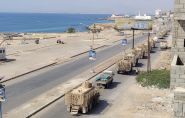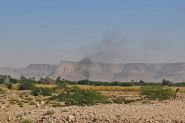- Home
- Middle East
- Qatar and Saudi Arabia Competing for the Syrian Market

©This is Beirut
After supporting several Syrian opposition groups in the early stages of the war, Qatar and Saudi Arabia are now looking to capitalize on the fall of former president Bashar al-Assad last December to establish a strategic foothold in the country.
With a new regime in place that aligns more closely with their interests, both countries are eager to secure a share of the “Syrian pie,” particularly in the energy sector, where they hold a competitive edge. However, one major obstacle remains: international sanctions, especially those imposed by the United States, which have so far blocked most forms of investment.
Saudi Arabia worked hard to overcome this obstacle by leveraging its close ties with US President Donald Trump. During his visit to the kingdom on Tuesday, Trump announced the lifting of US sanctions on Damascus, stating that he wanted to give Syria a “chance at greatness.” He later met with Syria’s transitional president, Ahmed el-Chareh, under the supervision of Crown Prince Mohammed bin Salman.
Washington’s decision clears the path for foreign investment to return to Syria — with Turkey positioned as the primary beneficiary. Ankara maintains strong ties with the Islamist group Hay’at Tahrir al-Sham, which previously controlled the Idlib region before seizing power in Syria alongside other Islamist factions. However, Saudi Arabia and Qatar are determined not to remain mere bystanders.
Subsidies and Energy
In late April, the two countries announced their intention to settle Syria’s $15 million debt to the World Bank — a move that came just days after the Syrian central bank governor and finance minister participated in the IMF and World Bank spring meetings in Washington.
The decision paves the way for further international financing and could help Syria reestablish ties with global institutions. But that’s not all.
“Paying off the debt is a practical way to win Syria’s favor, especially since the amount is negligible for oil-rich monarchies like Qatar and Saudi Arabia,” Middle East expert Émile Bouvier told This is Beirut.
“Especially since Syria could become highly attractive economically, as the war had previously blocked many oil and gas infrastructure projects, particularly those heading toward the Eastern Mediterranean and Turkey,” he added.
One such project is the Qatar-Turkey pipeline, launched in the early 2000s, which aimed to connect the Iranian-Qatari North Dome gas field to Turkey, passing through Saudi Arabia, Jordan, and Syria. Stalled by the war, it could now be revived through an agreement between all parties involved.
These oil and gas infrastructure projects represent significant opportunities for Qatar and Saudi Arabia to boost their hydrocarbon sales. They could, in turn, enter the European market, which is actively seeking alternatives to Russian gas. Additionally, Syria urgently needs energy to address its supply shortages.
In mid-March, Qatar began delivering gas to Syria via Jordan to help alleviate electricity shortages. "Qatar has also sought to assist with the electricity issue by sending two electricity-generating ships to dock on the Syrian coast in Latakia, thereby bolstering Syria's energy supply," explained Akram Kachee, Syria expert and professor at Sciences Po Lyon, to This is Beirut. "These promises have yet to be fulfilled, primarily due to US sanctions," he added.
Although the two ships were announced at the end of January as part of a joint operation between Qatar and Turkey, their arrival in Syria has not been confirmed since.
In early May, Syrian Finance Minister Mohammed Barnieh stated that Qatar would assist Damascus by covering public sector salaries amounting to $29 million per month for three months. According to a Syrian source interviewed by Reuters, this funding does not cover the Interior and Defense ministries due to Western concerns over the group’s past ties with extremism. Salary payments are expected to begin next month.
Another major concern is the reconstruction of Syria, which the UN estimates will cost $400 billion. This vast project has already drawn the interest of Turkey, the United States, European countries, and, of course, Gulf states, including Saudi Arabia and Qatar.
“In terms of reconstruction, they are no match for Turkey, which has numerous construction firms and genuine expertise in the field. Therefore, they will primarily focus on energy, financing, and subsidies,” said Émile Bouvier.
Competing Over a Share of Syria
Although Saudi Arabia, Qatar, and Turkey may collaborate on certain Syrian issues, each pursues its own distinct interests.
"Qatar has been involved in the Syrian issue since 2011, primarily due to its long-standing partnership with Turkey, which is now both militarily and financially engaged in Syria," explains Akram Kachee. As a long-time ally, Turkey also provided significant support to Qatar during the blockade imposed by Saudi Arabia.
Saudi Arabia’s approach to the Syrian issue differs significantly from those of Qatar and Turkey. "The primary interest for Saudi Arabia is to counter Turkey’s presence and prevent it from dominating Syria. Riyadh seeks to limit Turkish influence and avoid direct confrontation by positioning itself as an intermediary between the Turks and Israelis," explains Akram Kachee.
The withdrawal of the Iran-led resistance axis from Syria has created a power vacuum that Saudi Arabia is eager to fill. The kingdom views this as a crucial opportunity to expand its influence on both the local and regional stages while balancing the presence of other foreign powers in Syria.
The recent appointment of a Sunni president in Syria — who chose Saudi Arabia for his first official visit abroad — presents a golden opportunity for the kingdom. Ahmad el-Chareh has underscored his strong personal ties to Saudi Arabia, where he was born.
For Syria’s transitional president, the kingdom offers a way to broaden his regional support and preserve a measure of independence from Turkey. What is clear is that Riyadh played a central role in lifting the US sanctions that had long stifled Syria’s economic recovery.
Saudi Arabia is now working to cement its strategic position in Syria. It aims to block the return of Iranian influence by supporting the country’s stabilization — and with it, the transitional government — while also seeking to contain Turkish ambitions, preserve its status as a regional power, and capitalize on access to the Syrian market.
Read more




Comments